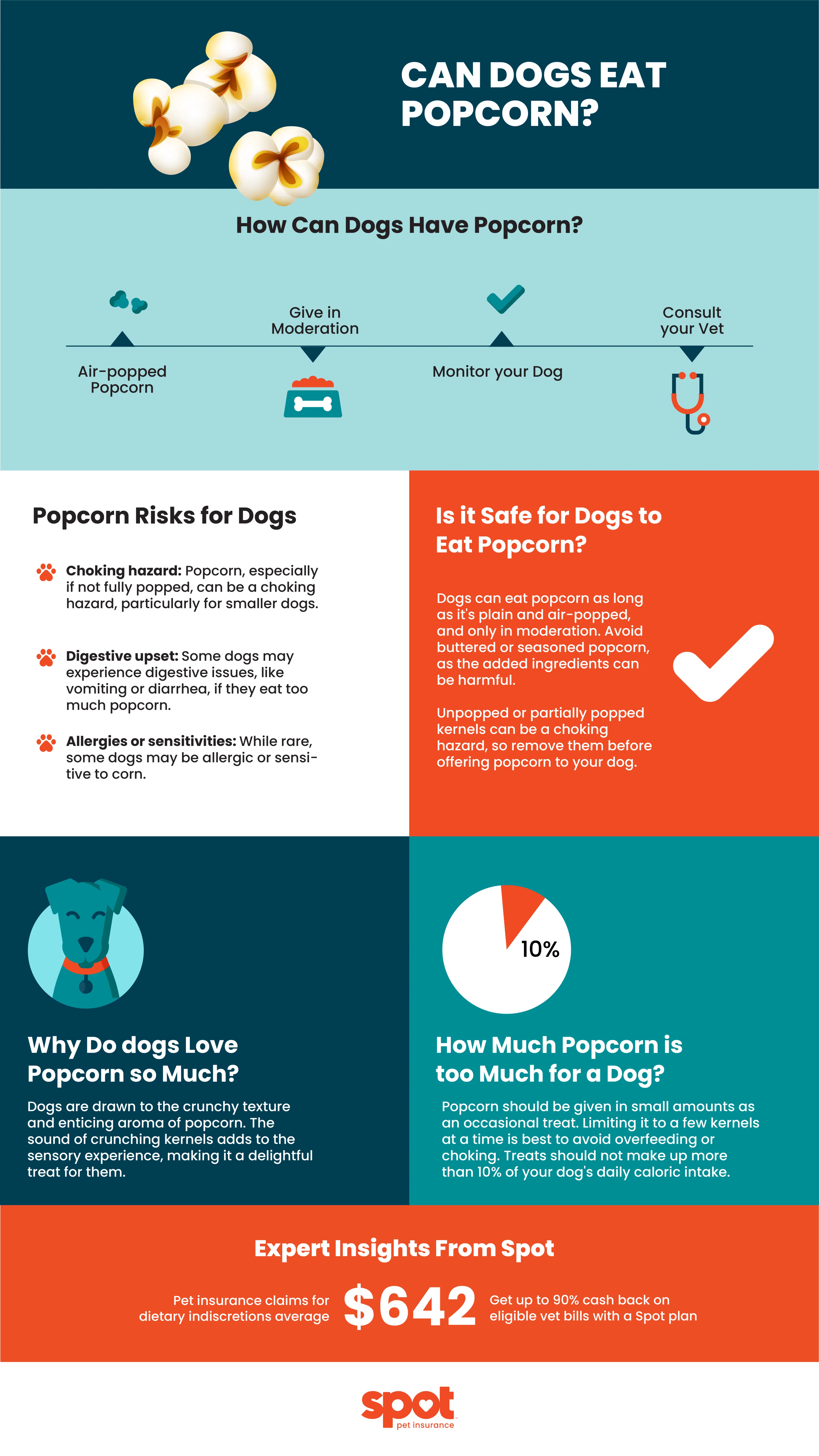Imagine it's movie night, and you're enjoying some popcorn while watching a film. Your furry friend sits beside you, patiently waiting for a stray kernel to fall their way. It's a common scenario, and many pet owners wonder, "Is popcorn safe for dogs?" Let's delve into this question and explore the nuances of sharing this popular snack with your canine companion.

Is Popcorn Safe for Dogs to Eat?
The answer is a bit complicated. While plain, air-popped popcorn is generally safe for dogs in moderation, certain types of popcorn and preparation methods can pose risks. Let's break down the details.
Popcorn for Dogs: Benefits and Risks
Can Dogs Have Popcorn?
Yes, dogs can enjoy popcorn as an occasional treat, but it's crucial to follow a few guidelines:
Air-popped popcorn: This is the safest option for dogs. It's low in calories and fat and doesn't contain ingredients like butter, salt, or other seasonings that may harm your dog.
Give in moderation: Popcorn should be an occasional treat, not a regular part of your dog's diet.
Monitor your dog: Watch for any signs of choking or digestive upset.
Consult your vet: If you have concerns about your dog's diet or health, always consult your veterinarian.
Popcorn Risks for Dogs
Even plain, air-popped popcorn carries some potential risks:
Choking hazard: Popcorn, especially if not fully popped, can be a choking hazard, particularly for smaller dogs.
Digestive upset: Some dogs may experience digestive issues, like vomiting or diarrhea, if they eat too much popcorn.
Allergies or sensitivities: While rare, some dogs may be allergic or sensitive to corn. Watch for signs of an allergic reaction, such as itching, hives, or gastrointestinal upset.
Expert Insights From Spot
While sharing our favorite foods with our pets can be tempting, it's important to remember that not all human foods are safe for dogs. Spot's internal data shows that pet insurance claims for dietary indiscretions average $642*, underscoring the importance of caution and research before sharing snacks with our pets.
Frequently Asked Questions
Is it ok for dogs to eat popcorn? Dogs can eat popcorn as long as it's plain and air-popped, and only in moderation. Avoid buttered or seasoned popcorn, as the added ingredients can be harmful. Unpopped or partially popped kernels can be a choking hazard, so remove them before offering popcorn to your dog4.
How many pieces of popcorn can I give my dog? A few pieces (3–5 for small dogs, up to a handful for larger breeds) are plenty as an occasional treat.
Can dogs eat sweet and salty popcorn? No, dogs should avoid sweet or salty popcorn since sugar, salt, and flavorings can be harmful and lead to dehydration or weight gain.
Why do dogs love popcorn so much? Dogs are drawn to the crunchy texture and enticing aroma of popcorn. The sound of crunching kernels adds to the sensory experience, making it a delightful treat for them6.
How much popcorn is too much for a dog? Popcorn should be given in small amounts as an occasional treat. Limiting it to a few kernels at a time is best to avoid overfeeding or choking. Treats should not make up more than 10% of your dog's daily caloric intake3.
Is popcorn a laxative for dogs? Popcorn isn’t a laxative, but eating too much—especially with kernels or added fats—can cause stomach upset or mild digestive issues.
Key Takeaway
While dogs can enjoy popcorn as a treat, it's essential to prioritize their safety and health. Stick to plain, air-popped popcorn, offer it in moderation, and monitor your dog for any adverse reactions. If you have any concerns, always consult your veterinarian for personalized advice.

As Spot’s resident cat enthusiast, I am dedicated to researching and sharing information that helps pet owners take the best care of their pets. Pet ownership comes with it’s share of challenges, but my goal is to help make this journey easier.
*Jan 2019 to April 2024 administrator claims data.
Burke, Anna. “Can Dogs Eat Popcorn?” American Kennel Club, American Kennel Club, 1 Sept. 2022, www.akc.org/expert-advice/nutrition/can-dogs-eat-popcorn.
Burke, Anna. “How Many Treats to Give a Dog a Day.” American Kennel Club, American Kennel Club, 7 Feb. 2023, www.akc.org/expert-advice/nutrition/how-many-treats-can-dog-have/.
“Can Dogs Eat Popcorn? Read before You Feed.” Purina, Purina, www.purina.co.uk/articles/dogs/feeding/what-dogs-eat/can-dogs-eat-popcorn.
Conklin, Lisa Marie. “Can Dogs Eat Popcorn? Here’s What Vets Say.” Reader’s Digest, Reader’s Digest, 6 Aug. 2024, www.rd.com/article/dogs-eat-popcorn/.
“Dogs and Popcorn.” Topsy’s Popcorn, Topsy’s Popcorn, 28 Feb. 2024, blog.topsyspopcorn.com/popcorn-and-pets/dogs-and-popcorn/.
Kalhagen, Alyson. “What Healthy and Tasty Treats Do Birds Love?” The Spruce Pets, The Spruce Pets, 17 Feb. 2022, www.thesprucepets.com/tasty-nutritious-treats-for-your-bird-390629.
The information presented in this article is for educational and informational purposes only and does not constitute or substitute for the advice of your veterinarian












